 |
 |
 |
 |
 |
 |
| |
 |
|
 |
 |
 |
  |
  |
 |
 |
 |
 |
|
|
 |
|
 |
 |
 |
BUILDING |
 |
|
 |
|
 |
 |
 |
| |
 |
| 
 |
Mercedes-Benz Museum
|
|
 |
 |
 |
 |
DESIGNER |
 |
|
|
 |
|
 |
 |
 |
| |
 |
|
 |
 |
 |
 |
DESCRIPTION |
 |
|
|
 |
|
 |
 |
 |
|
|
 |
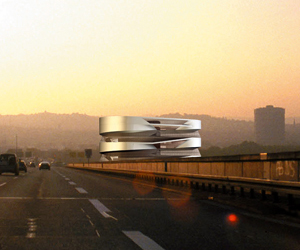 The new Mercedes-Benz Museum is located next to highway B14 at the entrance of Stuttgart. The museum covers 16,500 m2 of exhibition space for the historical collection of Mercedes-Benz, which consists of 160 cars. In addition to the exhibition space the museum houses a museum shop, a restaurant, offices and a sky lobby. As well as a new museum building the design also includes the development of the surrounding landscape. With 450,000 visitors a year the existing Mercedes-Benz Museum is one of the most visited museums in Stuttgart. The new Mercedes-Benz Museum is located next to highway B14 at the entrance of Stuttgart. The museum covers 16,500 m2 of exhibition space for the historical collection of Mercedes-Benz, which consists of 160 cars. In addition to the exhibition space the museum houses a museum shop, a restaurant, offices and a sky lobby. As well as a new museum building the design also includes the development of the surrounding landscape. With 450,000 visitors a year the existing Mercedes-Benz Museum is one of the most visited museums in Stuttgart.
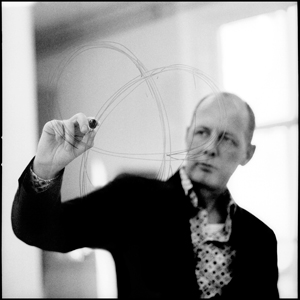 Ben van Berkel: ‘The Mercedes-Benz Museum binds together several radical spatial principles, and generates a wholly new typology as a result. It does this partly in response to its museum function, partly in response to its peripheral situation, and partly in response to questions and concerns that belong to the discipline of architecture itself.’ Ben van Berkel: ‘The Mercedes-Benz Museum binds together several radical spatial principles, and generates a wholly new typology as a result. It does this partly in response to its museum function, partly in response to its peripheral situation, and partly in response to questions and concerns that belong to the discipline of architecture itself.’ |
|
 |
 |
 |
|
 |
|
| Design model |
 |
|
 |
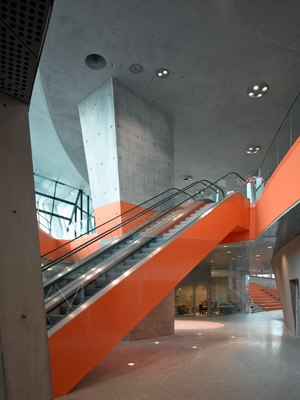 The visitor proceeds through the museum from top to bottom; during the ride up the atrium in one of the three elevators, visitors are shown a multimedia Preshow presentation. The elevators are like capsules with only a large slit at eye-level through which the visitor sees images of the history of Mercedes-Benz projected on the walls of the atrium. The visitor proceeds through the museum from top to bottom; during the ride up the atrium in one of the three elevators, visitors are shown a multimedia Preshow presentation. The elevators are like capsules with only a large slit at eye-level through which the visitor sees images of the history of Mercedes-Benz projected on the walls of the atrium.
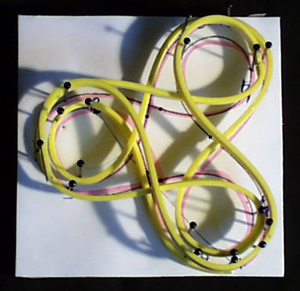 From the starting point at the top, the +eight level, the visitor may take one of the two spiralling ramps down; the first chain-linking the connecting Legend rooms, which are the secondary displays related to the history of Mercedes-Benz, and the second the collection of cars and trucks. The two trajectories cross each other continuously, mimicking the interweaving strands of a DNA helix, and making it possible for the visitor to change trajectories. From the starting point at the top, the +eight level, the visitor may take one of the two spiralling ramps down; the first chain-linking the connecting Legend rooms, which are the secondary displays related to the history of Mercedes-Benz, and the second the collection of cars and trucks. The two trajectories cross each other continuously, mimicking the interweaving strands of a DNA helix, and making it possible for the visitor to change trajectories.
Ben van Berkel: ‘The structure of the Mercedes-Benz Museum is based on a trefoil. The clover-leaf structure mathematically consists of three overlapping circles, of which the centre becomes a void forming a triangular atrium The semi-circular floors rotate around the central atrium forming horizontal plateaus which alternate between double and single heights. It is spatially complex; you can not see the trefoil from the museum. By using the strong design model we were able to organise ideas of infrastructure, exhibition spaces, programme and even structure. We looked at ideas of how, by moving through the chronologically ordered exhibition spaces from top to bottom, visitors follow the edge line of the building like a time machine. The line you follow becomes a wall then a ceiling and then a space, blurring the distinction between line, surface and volume.’ |
|
 |
 |
 |
|
 |
|
| Endless exhibition |
 |
|
 |
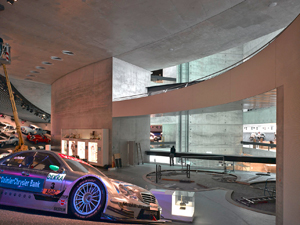 The two types of museum spaces have diametrically opposed characters. The Legend rooms are sheltered and artificially lit like theatrical spaces. Entering them is like entering a stage. The Collection rooms are exposed and day-lit, surrounded by huge, panoramic windows. The two aspects of the collection, the cars and the trucks are organized thematically starting with the two oldest cars at the top floor in the display dedicated to the invention of the car. The Legends are arranged in a chronological way. But this chronology is not rigid; the visitor is free to cross time zones. The structure enables the individual, dreamlike wandering that to our mind is part of the attraction and inspiration of the museum visit, but at the same time encourages the visitor to interact more consciously and dynamically with the displays by showing the items from unusual angles, perspectives and backgrounds. In the Mercedes-Benz Museum, wayfinding and orientation are intuitive and individual; the organisation offers a rational framework, which the visitor is free to follow or to deviate from when attracted by a specific display or program feature. The two types of museum spaces have diametrically opposed characters. The Legend rooms are sheltered and artificially lit like theatrical spaces. Entering them is like entering a stage. The Collection rooms are exposed and day-lit, surrounded by huge, panoramic windows. The two aspects of the collection, the cars and the trucks are organized thematically starting with the two oldest cars at the top floor in the display dedicated to the invention of the car. The Legends are arranged in a chronological way. But this chronology is not rigid; the visitor is free to cross time zones. The structure enables the individual, dreamlike wandering that to our mind is part of the attraction and inspiration of the museum visit, but at the same time encourages the visitor to interact more consciously and dynamically with the displays by showing the items from unusual angles, perspectives and backgrounds. In the Mercedes-Benz Museum, wayfinding and orientation are intuitive and individual; the organisation offers a rational framework, which the visitor is free to follow or to deviate from when attracted by a specific display or program feature.
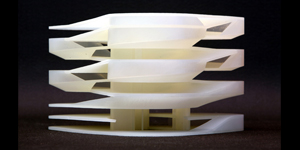 Ben van Berkel: ‘The building twists and turns around you like a sculpture full of contrapposto; now you see things and people, now you don’t. It would take you six hours to see every car, every display of the winding exhibition without ends. It will certainly take you several visits to figure out the building. At any point, it is difficult to know where you are precisely. You can be in the right space in the wrong place, or you can be in the right place in the wrong space. The building keeps unfolding, keeps surprising you. But you can not loose your way.’ Ben van Berkel: ‘The building twists and turns around you like a sculpture full of contrapposto; now you see things and people, now you don’t. It would take you six hours to see every car, every display of the winding exhibition without ends. It will certainly take you several visits to figure out the building. At any point, it is difficult to know where you are precisely. You can be in the right space in the wrong place, or you can be in the right place in the wrong space. The building keeps unfolding, keeps surprising you. But you can not loose your way.’ |
|
 |
 |
 |
|
 |
|
| Collaborative effort |
 |
|
 |
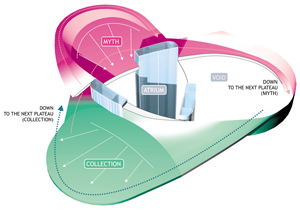 Since the complex innovative character of the museum and the limited timeframe for designing, planning and realizing the project, various forms of expert knowledge have been combined and interwoven. This initiated an intense collaboration with the client DaimlerChrysler Immobilien (DCI) GmbH, engineers, climate experts, interior architects, landscape architects and exhibition concept designers. Since the complex innovative character of the museum and the limited timeframe for designing, planning and realizing the project, various forms of expert knowledge have been combined and interwoven. This initiated an intense collaboration with the client DaimlerChrysler Immobilien (DCI) GmbH, engineers, climate experts, interior architects, landscape architects and exhibition concept designers.
Ben van Berkel: ‘The building is complex, the deadline was tight; the only solution was to control the geometry of the building as completely as possible using the latest computer technology. Digitally controlling the geometry made it possible to incorporate any kind of change quickly and efficiently, immediately knowing the effects of that change on all other aspects of the building.’ |
|
 |
 |
 |
 |
 |
 |
 |
VIDEO |
 |
|
|
 |
|
 |
 |
 |
| |
 |
|
 |
 |
 |
 |
LOCATION |
 |
|
|
 |
|
 |
 |
 |

|
 |

|
Continent |
|
 |
|
Nation |
|
 |
|
Land |
|
 |
|
District |
|
 |
|
Town |
|
 |
|
Address |
|
 |
|
|
|
 |
|
Website |
|
 |
|
 |
 |
 |
 |
MAP |
 |
|
|
 |
|
 |
 |
 |
| |
 |
|
 |
 |
 |
 |
|
TYPOLOGY |
 |
|
|
 |
|
 |
 |
 |
|
|
 |
ARCHITECTURE | Museums and buildings for exhibitions
Specialized museums
| |
 |
 |
 |
 |
CHRONOLOGY |
 |
|
|
 |
|
 |
 |
 |
Project |
 |
|
 |
| 
 |
2001 - 2002
project winner of competition
|
|
Realisation |
 |
|
 |
| 
 |
2002 - 2006 |
|
 |
 |
 |
 |
AWARDS |
 |
|
|
 |
|
 |
 |
 |
| 2008 |
 |
|
 |
Hugo-Häring Prize
Guter Bauten
Stuttgart |
|
 |
 |
 |
|
 |
|
| 2007 |
 |
|
 |
Leaf Awards
International Building of the Year |
|
 |
 |
 |
 |
 |
 |
 |
BIBILIOGRAPHIC REFERENCES |
 |
|
|
 |
|
 |
 |
 |
|
 |
| Lilli Hollein, "Gebaute Demokratie", H.O.M.E. 05/09, mai-juni/may-june 2009, "Architektur Deutschland" pp. 150-151 (146-158) |
|
|
"Mercedes-Benz Museum, Stuttgart, Germany", A+U. Architecture and Urbanisme, july 2007 [Automobile architecture], pp. 60-73
Ben van Berkel, Caroline Bos, "The museum of 21st century", A+U. Architecture and Urbanisme, july 2007 [Automobile architecture], pp. 71-73 (60-73) |
|
|
| Federico Bucci, "Automobilorfosi", Casabella 748, ottobre/october 2006, "Automobili, fabbriche, musei" pp. 84-93 |
|
|
| Laura Aquili, Ergian Alberg, "Dinamica tridimensionalità / New Mercedes-Benz Museum", L'Arca Plus 51, IV trimestre/4th quarter 2006 [Memoria e innovazione / Memory and Innovation], pp. 90-95 |
|
|
 Emiliano Gandolfi, "Museo Mercedes-Benz. Stoccarda - Germania/Mercedes-Benz Museum. Stuttgart - Germany. Ben van Berkel, UN Studio", The Plan 14, maggio-giugno/may-june 2006, "Architettura/Architecture" pp. 46-61 Emiliano Gandolfi, "Museo Mercedes-Benz. Stoccarda - Germania/Mercedes-Benz Museum. Stuttgart - Germany. Ben van Berkel, UN Studio", The Plan 14, maggio-giugno/may-june 2006, "Architettura/Architecture" pp. 46-61
Emiliano Gandolfi, "Interview with Ben van Berkel", The Plan 14, maggio-giugno/may-june 2006, "Architettura/Architecture" pp. 52-53 (46-61) |
|
|
| Laura Aquili, Ergian Alberg, "Complessità e dinamismo tridimensionali/New Mercedes Benz Museum, Stuttgart", L'Arca 209, dicembre/december 2005, pp. 38-43 |
|
|
Nicola Marzot, "Una macchina scenica che celebra il movimento/A "stage machinery" that celebrates movement", Rassegna 80, settembre/september 2005 [L'architetto inventore/The archietct inventor], "Il presente/The present" pp. 44-52 (44-53)
Frank Heinlein, "La struttura portante/The bearing structure", Rassegna 80, settembre/september 2005 [L'architetto inventore/The archietct inventor], "Il presente/The present" pp. 50 (44-53)
Frank Heinlein, "La facciata/The façade", Rassegna 80, settembre/september 2005 [L'architetto inventore/The archietct inventor], "Il presente/The present" pp. 53 (44-53) |
|
|
| "UN Studio van Berkel & Bos. Museo della Mercedes-Benz, Stoccarda" in Next. 8. Mostra Internazionale di Architettura. 2002, Marsilio, Venezia 2002, "Musei" pp. 128-129 |
|
 |
 |
 |
 |
 |
 |
 |
CLIENT |
 |
|
|
 |
|
 |
 |
 |
| |
 |
| Daimler Chrysler Immobilien AG, Berlin |
|
 |
 |
 |
 |
DIMENSIONAL
DATA |
 |
|
|
 |
|
 |
 |
 |
| Surface |
 |
|
 |
exhibition sq.m. 16.500
building sq.m. 35.000 |
|
| Volume |
 |
|
 |
|
 |
 |
 |
 |
STRUCTURES |
 |
|
|
 |
|
 |
 |
 |
| |
 |
|
 |
 |
 |
 |
STAFF |
 |
|
|
 |
|
 |
 |
 |
Project  |
 |
|
|
 |
|
|
 |
|
Project architect |
 |
| Ben van Berkel, Tobias Walliser, Caroline Bos |
|
Design team |
 |
| Marco Hemmerling, Hannes Pfau, Wouter de Jonge, Arjan Dingsté, Götz Peter Feldmann, Erwin Horst Manshof, Gregor Kahlau, Björn Rimner, Alexander Jung, Mike Herud, Thomas Klein, Simon Streit, Taehoon Oh |
|
Associate architect |
 |
Wenzel+Wenzel
Matias Wenzel, Markus Schwarz, Clemens Schulte-Mattler, Mark Schwesinger, Ina Kartbon, Christoph Friedrich, Stefanie Hertweck |
|
Project management |
 |
| Drees & Sommer, Stuttgart |
|
Exhibition design |
 |
HG Merz architekten
Mercedes Benz Museum |
|
Interior design |
 |
UN Studio
Concrete Architectural Associates, Amsterdam
Inside Outside - Petra Blaisse, Amsterdam (special elements) |
|
Structural consultant |
 |
|
Facades consultant |
 |
|
Climate control (HVAC) |
 |
|
Lighting engineer |
 |
| Ulrike Brandi Licht, Hamburg |
|
Infrastructure |
 |
|
Quantity surveyor |
 |
|
 |
 |
 |
 |
CREDITS |
 |
|
|
 |
|
 |
 |
 |
| |
 |
Photos © Christian Richters
Drawings © UNStudio
Text edited by UNStudio
Courtesy of UNStudio
|
|
 |
  |
 |
|
|